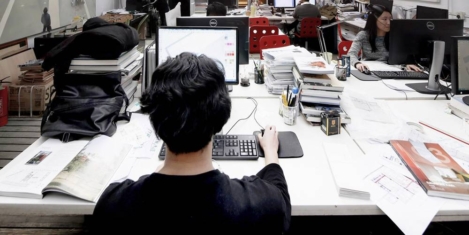To provide the best experiences, we use technologies like cookies to store and/or access device information. Consenting to these technologies will allow us to process data such as browsing behaviour or unique IDs on this site. Not consenting or withdrawing consent, may adversely affect certain features and functions.
The technical storage or access is strictly necessary for the legitimate purpose of enabling the use of a specific service explicitly requested by the subscriber or user, or for the sole purpose of carrying out the transmission of a communication over an electronic communications network.
The technical storage or access is necessary for the legitimate purpose of storing preferences that are not requested by the subscriber or user.
The technical storage or access that is used exclusively for statistical purposes.
The technical storage or access that is used exclusively for anonymous statistical purposes. Without a subpoena, voluntary compliance on the part of your Internet Service Provider, or additional records from a third party, information stored or retrieved for this purpose alone cannot usually be used to identify you.
The technical storage or access is required to create user profiles to send advertising, or to track the user on a website or across several websites for similar marketing purposes.
 A survey of 20,000 European workers carried out by Microsoft suggests that technology can distract workers rather than make them more productive. The study claims that a constant stream of messages, notifications and emails was particularly distracting. Workers also pointed out that the way employers use technology can also disrupt their work and make it harder for them to concentrate. Other factors identified in the report include lack of training and burn-out associated with always-on working.
A survey of 20,000 European workers carried out by Microsoft suggests that technology can distract workers rather than make them more productive. The study claims that a constant stream of messages, notifications and emails was particularly distracting. Workers also pointed out that the way employers use technology can also disrupt their work and make it harder for them to concentrate. Other factors identified in the report include lack of training and burn-out associated with always-on working.





 Most people who work in HR now recognise how essential technology is for delivering more strategic value to their organisation, but a new report suggests that HR teams are not prepared to meet the
Most people who work in HR now recognise how essential technology is for delivering more strategic value to their organisation, but a new report suggests that HR teams are not prepared to meet the 
 Over half of UK workers (53 percent) say that the standard of technology is a key consideration for accepting a new job role and more than 1 in 3 (37 percent) would decline a job based on poor hardware alone, claims a new survey. The survey of over 2,000 British adults carried out by gadgets and technology e-tailer, LaptopsDirect.co.uk found that having the latest technology was valued more than other office perks, such as flexible working (45 percent), the working environment/decor (39 percent) and staff discounts (33 percent). Nearly a quarter of respondents (74 percent) overall, believe technology makes them more productive at work, with workers in marketing valuing technology the highest, with 84 percent of the votes, followed by those in creative and photographic (81 percent), information and communications (78 percent), professional services (73 percent) and education (71 percent).
Over half of UK workers (53 percent) say that the standard of technology is a key consideration for accepting a new job role and more than 1 in 3 (37 percent) would decline a job based on poor hardware alone, claims a new survey. The survey of over 2,000 British adults carried out by gadgets and technology e-tailer, LaptopsDirect.co.uk found that having the latest technology was valued more than other office perks, such as flexible working (45 percent), the working environment/decor (39 percent) and staff discounts (33 percent). Nearly a quarter of respondents (74 percent) overall, believe technology makes them more productive at work, with workers in marketing valuing technology the highest, with 84 percent of the votes, followed by those in creative and photographic (81 percent), information and communications (78 percent), professional services (73 percent) and education (71 percent).




 The UK has been ranked as the eighth best country in the world for the ability to attract, retain, train and educate skilled workers, but while its ability to leverage diversity for talent competitiveness is boosted by its global knowledge skills – the UK is undermined by its weaker performance on tolerance and gender equality. According to the Global Talent Competitiveness Index GTCI) produced by the Adecco Group, with international business school INSEAD and Tata Communications, the UK has a particularly strong pool of global knowledge skills, a variable for which it is ranked third in the index boosted further by its strong regulatory, market and business landscape. But this is undermined by its internal openness, where it still lags behind, especially when it comes to gender equality. The report also suggests that although Article 50 was triggered in 2017, the ongoing negotiations and continuing lack of clarity over the UK’s position once it leaves the European Union in 2019, means the impact of Brexit is not yet clear.
The UK has been ranked as the eighth best country in the world for the ability to attract, retain, train and educate skilled workers, but while its ability to leverage diversity for talent competitiveness is boosted by its global knowledge skills – the UK is undermined by its weaker performance on tolerance and gender equality. According to the Global Talent Competitiveness Index GTCI) produced by the Adecco Group, with international business school INSEAD and Tata Communications, the UK has a particularly strong pool of global knowledge skills, a variable for which it is ranked third in the index boosted further by its strong regulatory, market and business landscape. But this is undermined by its internal openness, where it still lags behind, especially when it comes to gender equality. The report also suggests that although Article 50 was triggered in 2017, the ongoing negotiations and continuing lack of clarity over the UK’s position once it leaves the European Union in 2019, means the impact of Brexit is not yet clear.


 Managers are working an extra 44 days a year over and above their contracted hours, up from 40 days in 2015. These long hours are taking their toll, causing a surge in sick leave amongst managers suffering from stress and mental ill health, claims the Chartered Management Institute (CMI), which is calling on UK employers to provide greater support. Long hours and constant communication are having a detrimental effect on the wellbeing of managers it argues resulting in one in ten managers taking time off for mental health in the last year, and for those who do take time out, it’s for an average of 12 days. Of the 1,037 managers surveyed for the report, the average boss puts in an extra day each week. This is an extra 7.5 hours beyond their contracted weekly hours (44.4 hours actual compared to 37.3 contracted), adding up to an extra 43.8 days over the course of the year. This is up from 39.6 days in 2015. The rising gap between contracted and actual hours of work is in addition to an ‘always on’ digital culture, with 59 percent of managers saying they ‘frequently’ check their emails outside of work – up from 54 percent in 2015.
Managers are working an extra 44 days a year over and above their contracted hours, up from 40 days in 2015. These long hours are taking their toll, causing a surge in sick leave amongst managers suffering from stress and mental ill health, claims the Chartered Management Institute (CMI), which is calling on UK employers to provide greater support. Long hours and constant communication are having a detrimental effect on the wellbeing of managers it argues resulting in one in ten managers taking time off for mental health in the last year, and for those who do take time out, it’s for an average of 12 days. Of the 1,037 managers surveyed for the report, the average boss puts in an extra day each week. This is an extra 7.5 hours beyond their contracted weekly hours (44.4 hours actual compared to 37.3 contracted), adding up to an extra 43.8 days over the course of the year. This is up from 39.6 days in 2015. The rising gap between contracted and actual hours of work is in addition to an ‘always on’ digital culture, with 59 percent of managers saying they ‘frequently’ check their emails outside of work – up from 54 percent in 2015.




 The proportion of flexible space within occupier portfolios will continue to increase in 2018; a growing adoption of technology will redefine buildings, workplaces and portfolios; and it will be a year of decision for many businesses regarding Brexit. These are among the ‘UK Property Predictions 2018’ report from JLL which covers a range of different topics, with a particular focus on UK corporate occupiers. The report claims that traditional static portfolio concepts are being redesigned to incorporate new formats of space, co-working and a more fluid and diverse range of space options that support creativity, innovation and collaboration.
The proportion of flexible space within occupier portfolios will continue to increase in 2018; a growing adoption of technology will redefine buildings, workplaces and portfolios; and it will be a year of decision for many businesses regarding Brexit. These are among the ‘UK Property Predictions 2018’ report from JLL which covers a range of different topics, with a particular focus on UK corporate occupiers. The report claims that traditional static portfolio concepts are being redesigned to incorporate new formats of space, co-working and a more fluid and diverse range of space options that support creativity, innovation and collaboration. 










